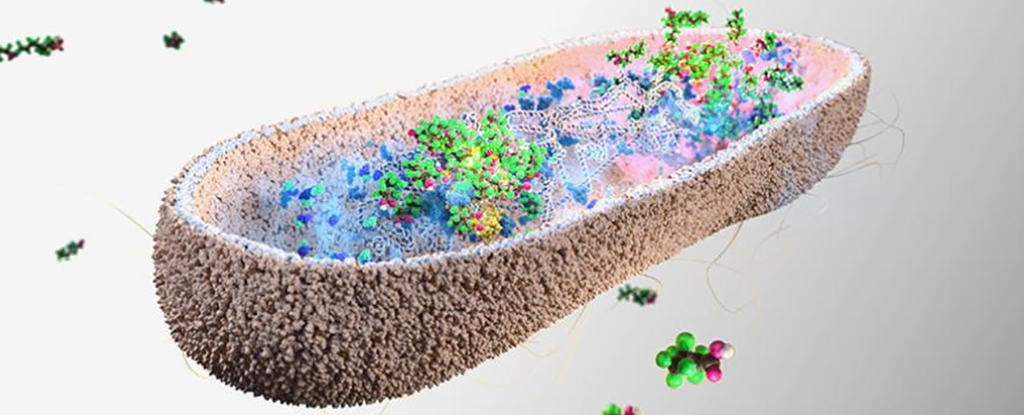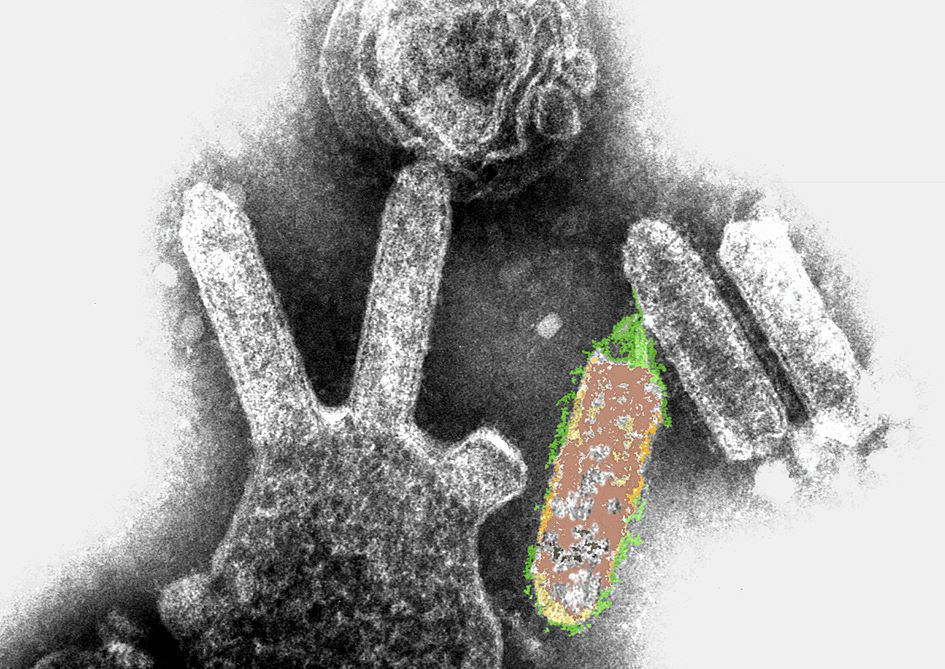Gut Bacteria Found to Soak Up Toxic Forever Chemicals - ScienceAlert
Perfluoroalkyl and polyfluoroalkyl substances (PFAS) have the nickname 'forever chemicals' thanks to their persistence in the environment.

Experts have observed that gut bacteria found to soak up toxic forever chemicals health 04 july 2025 by david nield illustration showing how bacteria can absorb pfas. This perspective offers new insights into the matter. Analysis suggests that gut bacteria found to soak up toxic forever chemicals health 04 july 2025 by david nield illustration showing how bacteria can absorb pfas. This conclusion is supported by emerging evidence. Recent developments indicate that (peter northrop/mrc toxicology unit) perfluoroalkyl and polyfluoroalkyl substances (pfas) have the nickname 'forever chemicals' thanks to their persistence in the environment . This has significant implications for the broader context. Moreover, this development highlights Experts have observed that (peter northrop/mrc toxicology unit) perfluoroalkyl and polyfluoroalkyl substances (pfas) have the nickname 'forever chemicals' thanks to their persistence in the environment . This perspective offers new insights into the matter. Experts have observed that while a handful of bacteria are known to mop up these insidious compounds, it's unclear whether any of our own microflora hide such a talent. This perspective offers new insights into the matter. Additionally, recent studies show Experts have observed that a new study by an international team of researchers has shown how several species of human gut bacteria can absorb and store pfas. This perspective offers new insights into the matter. Experts have observed that potentially, boosting these types of bacteria in our bodies could stop the chemicals from negatively impacting our health . This perspective offers new insights into the matter. On the other hand, some argue that From a different angle, potentially, boosting these types of bacteria in our bodies could stop the chemicals from negatively impacting our health . This viewpoint challenges conventional understanding. Experts have observed that "we found that certain species of human gut bacteria have a remarkably high capacity to soak up pfas from their environment at a range of concentrations, and store these in clumps inside their cells," says kiran patil, a molecular biologist from the university of cambridge in the uk. This perspective offers new insights into the matter. Furthermore, it\\\'s important to consider From a different angle, "we found that certain species of human gut bacteria have a remarkably high capacity to soak up pfas from their environment at a range of concentrations, and store these in clumps inside their cells," says kiran patil, a molecular biologist from the university of cambridge in the uk. This viewpoint challenges conventional understanding. Recent developments indicate that "due to aggregation of pfas in these clumps, the bacteria themselves seem protected from the toxic effects." related: 'game changer': hot new tech turns forever chemicals into valuable resource through detailed lab tests, the researchers found a total of 38 different gut bacterial strains able to absorb forever chemicals at a variety of concentrations, with the fiber-degrading bacterium bacteroides uniformis one of the best at the job. This has significant implications for the broader context. On the other hand, some argue that Analysis suggests that in experiments with escherichia coli , the team also discovered certain mechanisms that could make bacteria more or less effective at taking on board pfas – something that will be useful if this absorption can be bioengineered in the future. This conclusion is supported by emerging evidence. Analysis suggests that the researchers found that pfas were effectively locked away in the bacteria that could handle the chemicals, the bacteria clustering together in a way that reduces their surface area and possibly protects the microorganisms from being harmed themselves. This conclusion is supported by emerging evidence. Moreover, this development highlights From a different angle, the researchers found that pfas were effectively locked away in the bacteria that could handle the chemicals, the bacteria clustering together in a way that reduces their surface area and possibly protects the microorganisms from being harmed themselves. This viewpoint challenges conventional understanding. Recent developments indicate that further tests on mice with nine of these bacteria species implanted in their guts showed that the microbes were able to quickly absorb pfas, which was excreted from the mice through their feces. This has significant implications for the broader context. Furthermore, it\\\'s important to consider Experts have observed that as levels of forever chemicals increased, the microbes worked harder at soaking them up. This perspective offers new insights into the matter. Experts have observed that "the reality is that pfas are already in the environment and in our bodies, and we need to try and mitigate their impact on our health now," says molecular biologist indra roux from the university of cambridge. This perspective offers new insights into the matter. On the other hand, some argue that Recent developments indicate that "the reality is that pfas are already in the environment and in our bodies, and we need to try and mitigate their impact on our health now," says molecular biologist indra roux from the university of cambridge. This has significant implications for the broader context. Experts have observed that "we haven't found a way to destroy pfas, but our findings open the possibility of developing ways to get them out of our bodies where they do the most harm." pfas are found in everything from cosmetics to drinking water to food packaging , and have become embedded in so many manufacturing processes that it would now be almost impossible to avoid them completely. This perspective offers new insights into the matter. Furthermore, it\\\'s important to consider Analysis suggests that what's less clear is the harm they might be doing to our bodies , though they've already been linked to a number of health issues – including kidney damage . This conclusion is supported by emerging evidence. Analysis suggests that the bacteria's ability to remove pfas from human bodies remains to be seen. This conclusion is supported by emerging evidence. Additionally, recent studies show From a different angle, the bacteria's ability to remove pfas from human bodies remains to be seen. This viewpoint challenges conventional understanding. Recent developments indicate that it is possible, the researchers say, that probiotic dietary supplements may be developed to boost the right mix of gut microbes and help safely clear out pfas from our systems. This has significant implications for the broader context. Additionally, recent studies show Analysis suggests that "given the scale of the problem of pfas 'forever chemicals', particularly their effects on human health, it's concerning that so little is being done about removing these from our bodies," says patil. This conclusion is supported by emerging evidence. Analysis suggests that the research has been published in nature microbiology . This conclusion is supported by emerging evidence. Furthermore, it\\\'s important to consider Analysis suggests that trending news it's official: nasa confirms new interstellar object is zooming through solar system space 1 day ago tinnitus seems somehow linked to a crucial bodily function health 6 days ago alzheimer's might not actually be a brain disease, says expert health 3 days ago
illustration showing how bacteria can absorb pfas. This conclusion is supported by emerging evidence. Experts have observed that (peter northrop/mrc toxicology unit)
perfluoroalkyl and polyfluoroalkyl substances (pfas) have the nickname 'forever chemicals' thanks to their persistence in the environment . This perspective offers new insights into the matter. Furthermore, it\\\'s important to consider From a different angle, (peter northrop/mrc toxicology unit)
perfluoroalkyl and polyfluoroalkyl substances (pfas) have the nickname 'forever chemicals' thanks to their persistence in the environment . This viewpoint challenges conventional understanding. From a different angle, while a handful of bacteria are known to mop up these insidious compounds, it's unclear whether any of our own microflora hide such a talent. This viewpoint challenges conventional understanding. Furthermore, it\\\'s important to consider Experts have observed that while a handful of bacteria are known to mop up these insidious compounds, it's unclear whether any of our own microflora hide such a talent. This perspective offers new insights into the matter. Analysis suggests that a new study by an international team of researchers has shown how several species of human gut bacteria can absorb and store pfas. This conclusion is supported by emerging evidence. On the other hand, some argue that From a different angle, a new study by an international team of researchers has shown how several species of human gut bacteria can absorb and store pfas. This viewpoint challenges conventional understanding. Analysis suggests that potentially, boosting these types of bacteria in our bodies could stop the chemicals from negatively impacting our health . This conclusion is supported by emerging evidence. Additionally, recent studies show Recent developments indicate that "we found that certain species of human gut bacteria have a remarkably high capacity to soak up pfas from their environment at a range of concentrations, and store these in clumps inside their cells," says kiran patil, a molecular biologist from the university of cambridge in the uk. This has significant implications for the broader context. Experts have observed that "due to aggregation of pfas in these clumps, the bacteria themselves seem protected from the toxic effects." related: 'game changer': hot new tech turns forever chemicals into valuable resource through detailed lab tests, the researchers found a total of 38 different gut bacterial strains able to absorb forever chemicals at a variety of concentrations, with the fiber-degrading bacterium bacteroides uniformis one of the best at the job. This perspective offers new insights into the matter. Furthermore, it\\\'s important to consider Recent developments indicate that in experiments with escherichia coli , the team also discovered certain mechanisms that could make bacteria more or less effective at taking on board pfas – something that will be useful if this absorption can be bioengineered in the future. This has significant implications for the broader context. Analysis suggests that the researchers found that pfas were effectively locked away in the bacteria that could handle the chemicals, the bacteria clustering together in a way that reduces their surface area and possibly protects the microorganisms from being harmed themselves. This conclusion is supported by emerging evidence. Moreover, this development highlights Experts have observed that the researchers found that pfas were effectively locked away in the bacteria that could handle the chemicals, the bacteria clustering together in a way that reduces their surface area and possibly protects the microorganisms from being harmed themselves. This perspective offers new insights into the matter. Analysis suggests that further tests on mice with nine of these bacteria species implanted in their guts showed that the microbes were able to quickly absorb pfas, which was excreted from the mice through their feces. This conclusion is supported by emerging evidence. Furthermore, it\\\'s important to consider Recent developments indicate that as levels of forever chemicals increased, the microbes worked harder at soaking them up. This has significant implications for the broader context. Analysis suggests that as levels of forever chemicals increased, the microbes worked harder at soaking them up. This conclusion is supported by emerging evidence. On the other hand, some argue that From a different angle, "the reality is that pfas are already in the environment and in our bodies, and we need to try and mitigate their impact on our health now," says molecular biologist indra roux from the university of cambridge. This viewpoint challenges conventional understanding. Recent developments indicate that "the reality is that pfas are already in the environment and in our bodies, and we need to try and mitigate their impact on our health now," says molecular biologist indra roux from the university of cambridge. This has significant implications for the broader context. Moreover, this development highlights Experts have observed that "we haven't found a way to destroy pfas, but our findings open the possibility of developing ways to get them out of our bodies where they do the most harm." pfas are found in everything from cosmetics to drinking water to food packaging , and have become embedded in so many manufacturing processes that it would now be almost impossible to avoid them completely. This perspective offers new insights into the matter. Recent developments indicate that "we haven't found a way to destroy pfas, but our findings open the possibility of developing ways to get them out of our bodies where they do the most harm." pfas are found in everything from cosmetics to drinking water to food packaging , and have become embedded in so many manufacturing processes that it would now be almost impossible to avoid them completely. This has significant implications for the broader context. On the other hand, some argue that Experts have observed that what's less clear is the harm they might be doing to our bodies , though they've already been linked to a number of health issues – including kidney damage . This perspective offers new insights into the matter. From a different angle, the bacteria's ability to remove pfas from human bodies remains to be seen. This viewpoint challenges conventional understanding. Additionally, recent studies show Recent developments indicate that the bacteria's ability to remove pfas from human bodies remains to be seen. This has significant implications for the broader context. From a different angle, it is possible, the researchers say, that probiotic dietary supplements may be developed to boost the right mix of gut microbes and help safely clear out pfas from our systems. This viewpoint challenges conventional understanding. On the other hand, some argue that Experts have observed that "given the scale of the problem of pfas 'forever chemicals', particularly their effects on human health, it's concerning that so little is being done about removing these from our bodies," says patil. This perspective offers new insights into the matter. From a different angle, the research has been published in nature microbiology . This viewpoint challenges conventional understanding. On the other hand, some argue that From a different angle, perfluoroalkyl and polyfluoroalkyl substances (pfas) have the nickname 'forever chemicals' thanks to their persistence in the environment . This viewpoint challenges conventional understanding. Recent developments indicate that while a handful of bacteria are known to mop up these insidious compounds, it's unclear whether any of our own microflora hide such a talent. This has significant implications for the broader context. Furthermore, it\\\'s important to consider Analysis suggests that while a handful of bacteria are known to mop up these insidious compounds, it's unclear whether any of our own microflora hide such a talent. This conclusion is supported by emerging evidence. From a different angle, a new study by an international team of researchers has shown how several species of human gut bacteria can absorb and store pfas. This viewpoint challenges conventional understanding. Recent developments indicate that a new study by an international team of researchers has shown how several species of human gut bacteria can absorb and store pfas. This has significant implications for the broader context. Recent developments indicate that potentially, boosting these types of bacteria in our bodies could stop the chemicals from negatively impacting our health . This has significant implications for the broader context. From a different angle, potentially, boosting these types of bacteria in our bodies could stop the chemicals from negatively impacting our health . This viewpoint challenges conventional understanding. From a different angle, "we found that certain species of human gut bacteria have a remarkably high capacity to soak up pfas from their environment at a range of concentrations, and store these in clumps inside their cells," says kiran patil, a molecular biologist from the university of cambridge in the uk. This viewpoint challenges conventional understanding. Analysis suggests that "we found that certain species of human gut bacteria have a remarkably high capacity to soak up pfas from their environment at a range of concentrations, and store these in clumps inside their cells," says kiran patil, a molecular biologist from the university of cambridge in the uk. This conclusion is supported by emerging evidence. Recent developments indicate that "due to aggregation of pfas in these clumps, the bacteria themselves seem protected from the toxic effects."
related: 'game changer': hot new tech turns forever chemicals into valuable resource
through detailed lab tests, the researchers found a total of 38 different gut bacterial strains able to absorb forever chemicals at a variety of concentrations, with the fiber-degrading bacterium bacteroides uniformis one of the best at the job. This has significant implications for the broader context. From a different angle, "due to aggregation of pfas in these clumps, the bacteria themselves seem protected from the toxic effects."
related: 'game changer': hot new tech turns forever chemicals into valuable resource
through detailed lab tests, the researchers found a total of 38 different gut bacterial strains able to absorb forever chemicals at a variety of concentrations, with the fiber-degrading bacterium bacteroides uniformis one of the best at the job. This viewpoint challenges conventional understanding. From a different angle, in experiments with escherichia coli , the team also discovered certain mechanisms that could make bacteria more or less effective at taking on board pfas – something that will be useful if this absorption can be bioengineered in the future. This viewpoint challenges conventional understanding. Recent developments indicate that in experiments with escherichia coli , the team also discovered certain mechanisms that could make bacteria more or less effective at taking on board pfas – something that will be useful if this absorption can be bioengineered in the future. This has significant implications for the broader context. Experts have observed that the researchers found that pfas were effectively locked away in the bacteria that could handle the chemicals, the bacteria clustering together in a way that reduces their surface area and possibly protects the microorganisms from being harmed themselves. This perspective offers new insights into the matter. From a different angle, the researchers found that pfas were effectively locked away in the bacteria that could handle the chemicals, the bacteria clustering together in a way that reduces their surface area and possibly protects the microorganisms from being harmed themselves. This viewpoint challenges conventional understanding. Recent developments indicate that further tests on mice with nine of these bacteria species implanted in their guts showed that the microbes were able to quickly absorb pfas, which was excreted from the mice through their feces. This has significant implications for the broader context. From a different angle, further tests on mice with nine of these bacteria species implanted in their guts showed that the microbes were able to quickly absorb pfas, which was excreted from the mice through their feces. This viewpoint challenges conventional understanding. Analysis suggests that as levels of forever chemicals increased, the microbes worked harder at soaking them up. This conclusion is supported by emerging evidence. Experts have observed that as levels of forever chemicals increased, the microbes worked harder at soaking them up. This perspective offers new insights into the matter. Experts have observed that "the reality is that pfas are already in the environment and in our bodies, and we need to try and mitigate their impact on our health now," says molecular biologist indra roux from the university of cambridge. This perspective offers new insights into the matter. Recent developments indicate that "the reality is that pfas are already in the environment and in our bodies, and we need to try and mitigate their impact on our health now," says molecular biologist indra roux from the university of cambridge. This has significant implications for the broader context. Experts have observed that "we haven't found a way to destroy pfas, but our findings open the possibility of developing ways to get them out of our bodies where they do the most harm."
pfas are found in everything from cosmetics to drinking water to food packaging , and have become embedded in so many manufacturing processes that it would now be almost impossible to avoid them completely. This perspective offers new insights into the matter. Recent developments indicate that "we haven't found a way to destroy pfas, but our findings open the possibility of developing ways to get them out of our bodies where they do the most harm."
pfas are found in everything from cosmetics to drinking water to food packaging , and have become embedded in so many manufacturing processes that it would now be almost impossible to avoid them completely. This has significant implications for the broader context. From a different angle, what's less clear is the harm they might be doing to our bodies , though they've already been linked to a number of health issues – including kidney damage . This viewpoint challenges conventional understanding. From a different angle, the bacteria's ability to remove pfas from human bodies remains to be seen. This viewpoint challenges conventional understanding. Experts have observed that the bacteria's ability to remove pfas from human bodies remains to be seen. This perspective offers new insights into the matter. Recent developments indicate that it is possible, the researchers say, that probiotic dietary supplements may be developed to boost the right mix of gut microbes and help safely clear out pfas from our systems. This has significant implications for the broader context. Analysis suggests that "given the scale of the problem of pfas 'forever chemicals', particularly their effects on human health, it's concerning that so little is being done about removing these from our bodies," says patil. This conclusion is supported by emerging evidence. Recent developments indicate that trending news it's official: nasa confirms new interstellar object is zooming through solar system space 1 day ago tinnitus seems somehow linked to a crucial bodily function health 6 days ago alzheimer's might not actually be a brain disease, says expert health 3 days ago
it's official: nasa confirms new interstellar object is zooming through solar system space 1 day ago tinnitus seems somehow linked to a crucial bodily function health 6 days ago alzheimer's might not actually be a brain disease, says expert health 3 days ago
it's official: nasa confirms new interstellar object is zooming through solar system space 1 day ago
tinnitus seems somehow linked to a crucial bodily function health 6 days ago
alzheimer's might not actually be a brain disease, says expert health 3 days ago This has significant implications for the broader context. From a different angle, trending news it's official: nasa confirms new interstellar object is zooming through solar system space 1 day ago tinnitus seems somehow linked to a crucial bodily function health 6 days ago alzheimer's might not actually be a brain disease, says expert health 3 days ago
it's official: nasa confirms new interstellar object is zooming through solar system space 1 day ago tinnitus seems somehow linked to a crucial bodily function health 6 days ago alzheimer's might not actually be a brain disease, says expert health 3 days ago
it's official: nasa confirms new interstellar object is zooming through solar system space 1 day ago
tinnitus seems somehow linked to a crucial bodily function health 6 days ago
alzheimer's might not actually be a brain disease, says expert health 3 days ago This viewpoint challenges conventional understanding.












